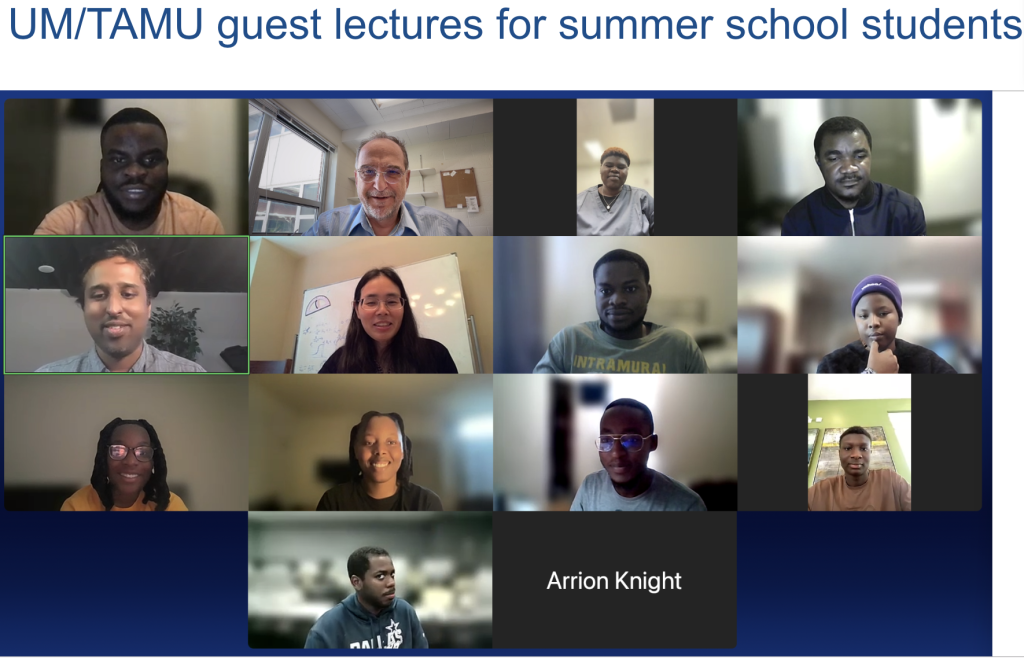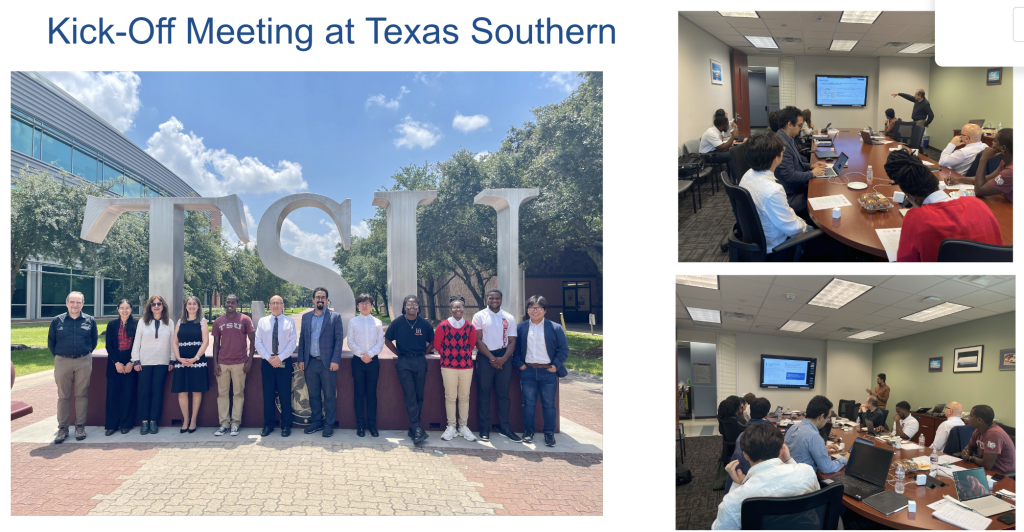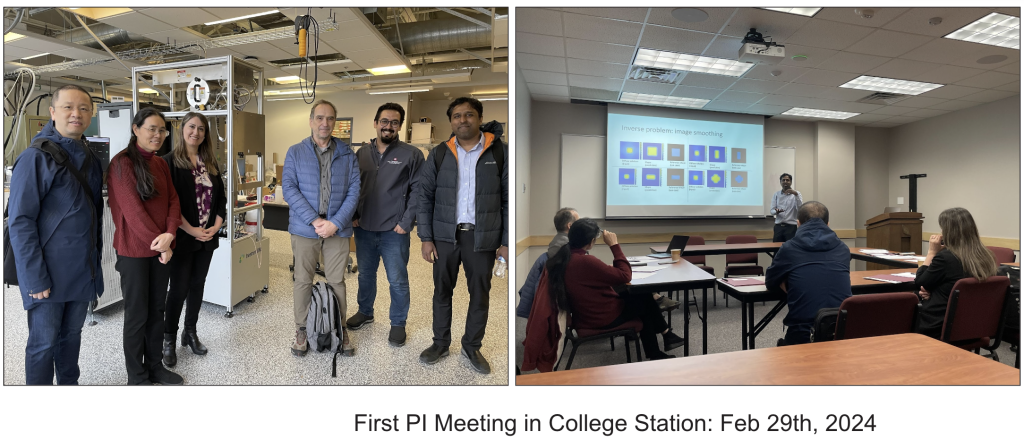or keep pressing Tab key no navigate

This National Science Portal project comprises a multidisciplinary team of experts in applied mathematics, physics, statistics, optimization, machine learning, and materials scientists from Texas Southern University, Prairie View A&M University, Texas A&M University, and University of Michigan. The center’s primary objective is to develop a foundational SciML framework that will drive advancements in materials design and discovery.
This Center places a strong emphasis on knowledge development and building diversity in the scientific community, fostering the growth of SciML and Data Science programs in Historically Black Colleges and Universities (HBCUs) and Minority-Serving Institutions (MSIs), and actively involving undergraduate and graduate students in cutting-edge research.
The center will develop a foundational SciML framework that will drive advancements in materials design and discovery. By focusing on the Electron beam powder bed fusion (EBPBF) platform, the center will leverage the inherent equivalence between electron beam processing and scanning electron microscopy, utilizing sensor data to facilitate data-driven and principle-guided scientific exploration. The research activities will involve the development of mathematical models such as Bayesian neural networks and sparsified SciML models, with the potential for broader application in various fields.

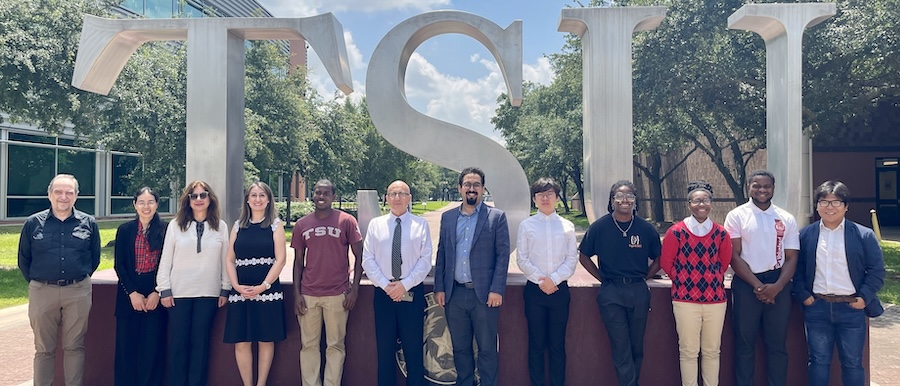
Air Force Office of Scientific Research, Award no. FA9550-23-1-0725
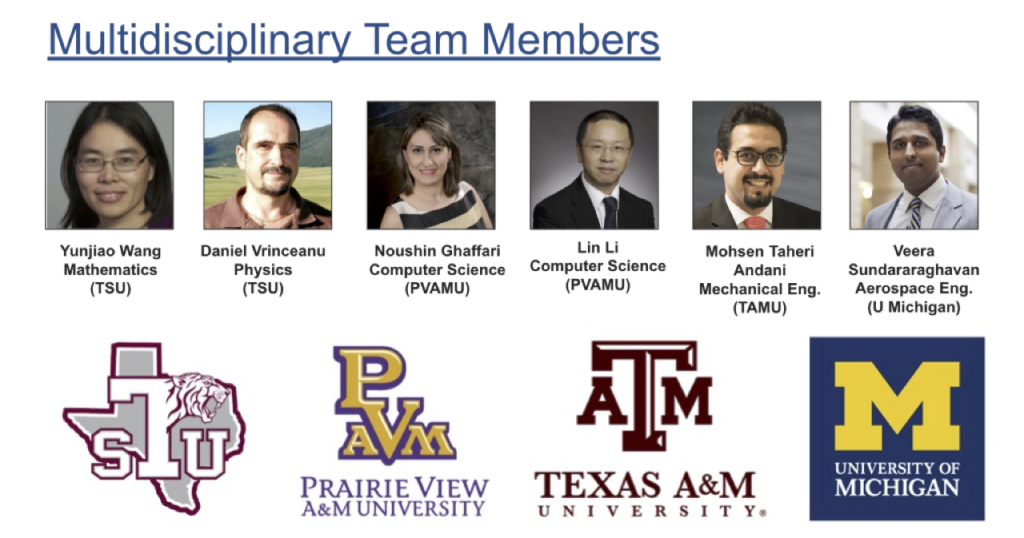
Graduate Students
Undergraduate Students
The High-Performance Computing Center (TSU-HPCC) at TSU (directed by PI Vrinceanu) was established in 2008 to promote research and training on campus by integrating leading-edge high-performance computing and visualization for the faculty, staff, and students of TSU. TSU-HPCC provides consulting and assistance to campus researchers with experimental software and/or hardware needs and training in parallel and grid computing. The software/support that will be provided includes
(1) generic operating systems, compilers, and libraries of common use in scientific communities, and tools for concurrency and parallelism,
(2) specialized quantum chemistry packages that include Gaussian, Molpro, and VASP,
(3) machine learning software, such as TensorFlow, Spark, PyTorch, and Bioconductor
(4) molecular dynamics and atomistic simulation packages, such as LAMMPS, GROMACS, and VMD, that include molecular visualization facilities and
(5) bioinformatics packages for genetic analysis, sequencing, alignment, and annotation.
The Department of Mathematics has a computer lab that offers the relevant technology to help students learn mathematics and its applications. The available software applications include Microsoft Office, Matlab, Maple, R and R-Studio.
The research team has essential hardware for this project, including Macbooks, Dell laptops, NVIDIA Jetson Nanos, and an NVIDIA DGX workstation with a powerful Intel Xeon E5-2698 CPU and 4 NVIDIA Tesla V1000 GPUs. The PIs have access to the Deep Learning Lab’s NVIDIA DGX-1 systems, featuring eight Tesla P100 GPU accelerators each and providing impressive performance for big data analytics. Teaching and training activities will occur in the Department of Computer Science, furnished with large classrooms and well-equipped computer labs.\
U-M provides a comprehensive computing environment with data acquisition, data processing, and graphics development capabilities. The university has licenses for high-performance compilers and mathematical tools. ARC-TS maintains the Great Lakes Slurm High-Performance Computing (HPC) cluster, allowing researchers to focus on research. The cluster has approximately 13,000 CPU cores, access to GPUs and large-memory nodes, and also supports emerging uses like machine learning and genomics. ARC-TS also provides storage infrastructure and a local online file system for a total of 1530 TB. The Center for Advanced Computing provides software support and licenses for widely used software. Dr. Sundararaghavan’s group has dedicated access to computational resources through the PRISMS program and an NSF XSEDE allocation.
Prof. Andani at TAMU has a dedicated space equipped with resources for metal processing and characterization, which includes the Freemelt ONE, an open-source electron powder bed system.
We will leverage the unique features of the Freemelt ONE system in this project. Its small vacuum chamber provides advantages for experimenting with different material systems. We plan to utilize the system’s additional ports for real-time monitoring of the manufacturing process, using tools such as the Backscatter Electrons (BSE) detector and X-Ray Detector. The open-source platform of the system allows for customization of the size and movement of the electron beam, enabling us to optimize the melt process sequencing. Throughout the process, we will consider insights from microstructure modeling and focus on each individual time stamp to achieve the desired results.
[1] T. D. Truong, H. You, M. T. Andani, Unveiling spot melting strategies for microstructure control in electron beam powder bed fusion, 2024 Annual International Solid Freeform Fabrication Symposium (SFF Symp 2024).
[2] H. You, T. D. Truong, M. T. Andani, Exploring the Impact of Island Spot Scanning on Microstructural Texture in Ti-6Al-4V Fabricated by Electron Beam Powder Bed Fusion, 2024 Annual International Solid Freeform Fabrication Symposium (SFF Symp 2024).
The center currently currently has multiple undergraduate and graduate research assistantships available. Any student who has a strong academic background in math, physics, or computer science are encouraged to apply.
If you are interested, please send the following documents to Dr. Vrinceanu (Daniel.Vrinceanu at tsu.edu) or Dr. Wang (Yunjiao.wang at tsu.edu):
Supported by Air Force Office of Scientific Research, the Center for Scientific Machine Learning for Material Science (CSML-MS) invites undergraduates interested in data science to apply for the Summer Undergraduate REsearch program in Data Science (SURE-DS) this summer 2025. The details will be posted in the Spring of 2025.
On March 28, 2025, three students, Mathew, Sharie, and Ola from the Center for Scientific Machine Learning for Materials Science (CSML-MS) visited YES Prep North Rankin Elementary. The second graders were thrilled to participate in a fun, hands-on activity—measuring each other’s heights and creating histograms out of candy! Their excitement lit up the room, as you can see from the big smiles in the photo below. One student even wanted to measure Mathew with a 1.5m measuring tape:)
The students at YES Prep were wonderfully well-behaved, and the teachers were incredibly supportive throughout the visit. Mathew, Sharie, and Ola had a fantastic time, and the school greatly enjoyed their visit as well. In fact, they were invited back on the spot to host more outreach activities in the future!
We’re so proud of our CSML-MS students for inspiring young minds and representing our program with such enthusiasm and heart.


Title: Introduction to Materials Science and Metal Additive Manufacturing
The Center for Scientific Machine Learning for Material Science invites students and researchers to participate in a short course on Introduction to Materials Science and Metal Additive Manufacturing. This course offers a unique opportunity to learn about the latest advancements in metal additive manufacturing and the foundational knowledge of materials science essential to understanding these cutting-edge processes.
The lectures will be led by Dr. Taheri Andani’s research group at Texas A&M University, experts in metal additive manufacturing and materials science. Participants will gain insights into how materials science principles are applied to optimize additive manufacturing techniques, with detailed exploration of process mechanics and materials behavior.
Course Schedule:
Don’t miss this opportunity to learn from leading experts in the field
